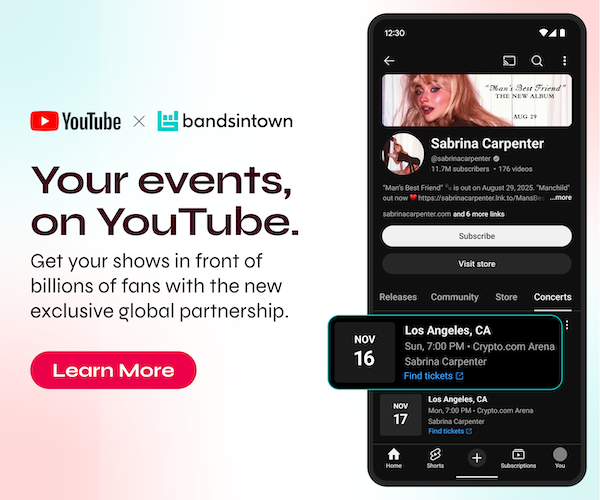Was anyone in the industry talking about Merck Mercuriadis a couple of years ago? Well, yes, of course they were, albeit in a comparatively genteel, low-level kind of way.
“There goes Merck Mercuriadis,” they’d whisper in the Soho House bar. “He’s managed both Morrissey and Axl Rose, and he ran Sanctuary – must be a glutton for punishment!” Or perhaps, simply: “There goes Merck Mercuriadis. If you want to blag Nile Rodgers tickets, he’s your man.”
These are not the most immediate descriptions that come to mind about Mercuriadis today. The modern set of Soho/Shoreditch industry gossip-mongers are more likely to observe: “There goes Merck Mercuriadis, the man who keeps buying bloody everything in sight.”
Or, in the case of the industry’s formerly-acquisitive parties: “There go the copyrights I wanted, snapped up by Moneybags Mercuriadis… again.”
Yet to glibly illustrate Merck as a mere music biz big spender doesn’t quite do justice to his evangelistic belief in the value (and future value) of songs. He might be backed by hundreds of millions, he might have acquired catalogues from Benny Blanco, The Chainsmokers, The-Dream, Dave Stewart and everyone in between – but, according to Mercuriadis, there is a wider point behind his relentless thirst for deals.
As the Hipgnosis Songs Fund founder explains below in his five-point manifesto – aka the things he’d change about the music business tomorrow – he’s aiming to shake up the very power balance this industry is built on…
1. Redress Where Songwriters Sit In The Economic Equation
There is an imbalance that exists between what is paid to the recorded music side of this industry and what is paid to songwriters; it’s not fair and equitable as it currently stands. In the old days it didn’t matter, because when I started, which was the old days, 90% of signed artists wrote their own songs.
They knew who they were, what they wanted to be, what the album cover should look like, what the stage show should look like. And the job of someone like me [as a manager] was to (a) believe in them and (b) put a strategy in place to bring their ideas to fruition. Well, today, 90% of signed artists are still really talented people, but almost every song you hear on the radio is written, at least in part, by an outside songwriter. If you’re Zara Larsson and you have access to these songwriters, you’re top of the chart.
“the songwriter is not being treated fairly and equitably, and we need to redress that imbalance.”
If you’re Iggy Azalea, and five years ago you had the biggest song in the world, with Fancy, but now, for whatever reason, you no longer have access to these songwriters, you’re nowhere. Because the song is the currency on which this business trades. And yet the songwriter is not being treated fairly and equitably, and we need to redress that imbalance. Right now, the Jonas Brothers are on tour in America, making millions of dollars, and what the crowd really want to hear from them is a song [they’ve heard] that Ryan Tedder wrote.
I’m not suggesting that Ryan should be getting [more] of the money that the band generates from live, but it highlights the imbalance between what the record company gets and what Ryan gets. It’s important to be clear, this is not about re-dressing the balance between what the artist gets and what the songwriter gets, because, as we know, the artist is on a sliver of what the record company gets anyway. This is about the balance between what is paid for recorded music and what’s paid for the song. That change starts with the CRB ruling increasing songwriters’ share of the pie by 44% [in the US] over the next four years. It should then continue with the Department of Justice dropping the consent decree laws that affect both ASCAP and BMI in the United States, and it should roll on from there.
2. Create A Truly Powerful Songwriters Guild
I want to use what is currently half a billion dollars’ worth of assets, and what will be billions of dollars’ worth of assets acquired by Hipgnosis to, again, change where the songwriter sits in the economic equation, but also be the catalyst for a real Songwriters Guild.
Not what we currently have, because there’s no real advocacy at this moment in time. There isn’t anyone advocating for the songwriter. The three big companies can’t, because they’re owned by big recorded music companies.
The performing rights societies can’t, because they’re bound by the consent decree rule – and they’re also very cash rich organisations that don’t want to upset the applecart. I want to end up with a scenario similar to the Screenwriters Guild where, on behalf of movie writers, every three years they march into all the studios and say, ‘Hey, I don’t care if you’ve got Reese Witherspoon or George Clooney to star in this movie; if you don’t get a script, there is no movie. And you’re not going to get a script unless you pay the writers properly.’
“I can’t own all the songs in the world, but I can play a part in making sure all the songwriters in the world benefit.”
So, every three years, they scream and shout at each other, they call each other names, they threaten to bring production to a standstill, but at the end of the day they figure out a way to pay the writers more money – and everybody lives happily ever after. Or at least for three more years.
I want the songwriters to be represented in exactly that way. It’s a six or seven-year plan, but I intend Hipgnosis to be the catalyst to make that happen. If you think about what we’ve done, we’ve established songs as an asset class, and an asset class that is now recognised by the most important investment communities in the world as being as good as gold or oil. That’s amazing for Hipgnosis, but it’s amazing for all songwriters. It will benefit everyone.
I can’t own all the songs in the world, but I can play a part in making sure all the songwriters in the world benefit. And that’s where this Songwriters Guild, with real teeth, will come into play.
3. Artists Should Get Their Masters Back
The system that exists currently [in record deals] is not right. It is basically: we’ll lend you money to build the house, you’ll pay that money back, we’ll still own the house. It doesn’t mean that those companies that fund artists can’t be involved for the long-term, but once the artist has paid for their records and the company that made a capital investment has been able to make a great return, the artist should get the rights back.
There can be long-term distribution deals, there can be longterm licensing deals, but that system of lending the money, getting paid back and then still owning the house, that has to change. I’m a big believer in the value of the major companies and the best of the independent companies out there. Because the one thing as an artist that you’re never going to want to do is create that infrastructure.
“The system that exists currently [in record deals] is not right.”
Right now, there’s someone working for Universal, Warner or Sony in Brazil who knows who the best DJs, most influential journalists are etc. I’m never going to know those things, so I’m always going to want to be in business with those companies and I’m always going to value the incredible work they do. But, the economics of it, in terms of who ends up owning these assets, needs to change. That’s not to say there can’t be some hybrid, but it can no longer continue as it is. We’re talking about a long hard road towards this, and I would say we haven’t even begun yet.
Because part of the problem, and this informs points 1 and 2, is that it’s very easy for people to live in a paradigm that has existed for 75 or 100 years. You sit there and think you can’t do anything about it, until someone comes along and does do something about it. As regards points one 1 and 2, that’s exactly what I’m doing – being that catalyst and demonstrating to people that these things are possible. Eventually we’ll get to 3 as well.
4. Revolutionise ‘360’
If you look at the great British labels of the sixties and seventies, the one thing they had in common is that they identified talent and then went to work with that talent; they would make a capital investment in that talent. But then they would spread that investment across many income streams, so it was not unusual for those labels to manage the artist, to handle merchandise for the artist, to book the live shows and to publish the artist. When they did that, they effectively created a pool [of money].
What I want, going forward, is that if there is going to be a concept of ‘360’ in today’s [record] business, that concept should be one where all the money from those income streams goes into a [central] pool. The split on that [pool] will favour the record company when the artist is unrecouped. Then, as time goes on, it becomes more even, more like 50/50, and then the more successful an artist becomes, the more the pendulum swings in their favour.
“I want to revolutionise 360 deals and create fair and equitable payment structures for artists.”
What exists at the moment is that you sign to a [frontline major] label and they might give you an advance of £200,000, but you might also have to pay them 20% of your publishing as part of your 360 deal. Then you go out and make a publishing deal for £500,000. Suddenly you’ve got to give the label £100,000 [of that publishing money], which is fair enough. But that £100,000 becomes a profit centre for the [record company]; you’ve given them £100,000, but you’re still £200,000 unrecouped [on your record deal], not £100,000 unrecouped.
So I want to revolutionise 360 deals and create fair and equitable payment structures for artists whereby the more successful you get, the bigger share of the pie you get.
5. Value Managers Properly And Fairly
The role of the manager needs to be reconsidered, particularly by the legal community, which seems to want to marginalise it. One of the key issues is that managers should get paid for the work that they do in perpetuity.
That’s not to say they should get paid on an entire contract, but whichever songs or albums that come out during their tenure as manager, they should get paid in perpetuity. It’s no different to a producer.
Your manager could be someone that you spend 10 hours a day with, and a lawyer’s telling you, ‘Don’t pay this person.’ Whereas you could go into a studio tomorrow with someone who you’ve only met once and who you’re never going to work with again, and you would owe them their royalty forever.
“The role of the manager needs to be reconsidered.”
Why should a manager be expected to put their life, their heart and soul into an artist and not be rewarded for it in their later days if they’re successful – when [the opposite is true] for a record company, publisher or producer? Managers play an incredibly important role – the good ones. There are plenty of bad ones, I’m not speaking on their behalf; I’m speaking for the ones that can quite rightly be credited with a huge part of an artist’s success, who are prepared to make other people believe in their acts, who are committed to their artists and who put the time and the effort in to do great work.
As things stand, they’re far too easily cut out of the picture.
- Hipgnosis is based at Tileyard London, located at King’s Cross, Europe’s largest community of artists, studios and businesses, all revolving around music, ideas, collaboration and creativity.

MBUK is available via an annual subscription through here.
All physical subscribers will receive a complimentary digital edition with each issue.Music Business Worldwide




